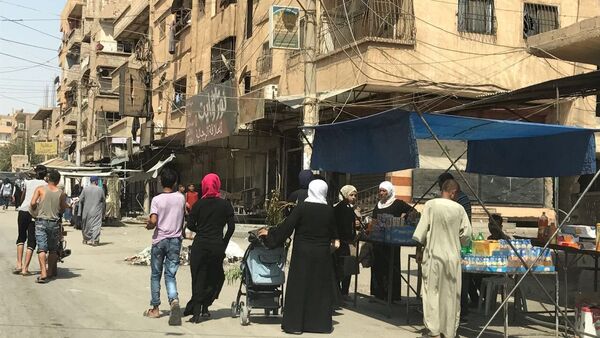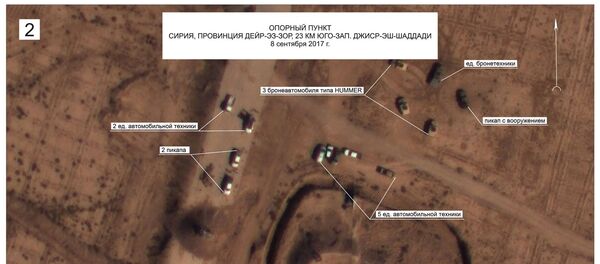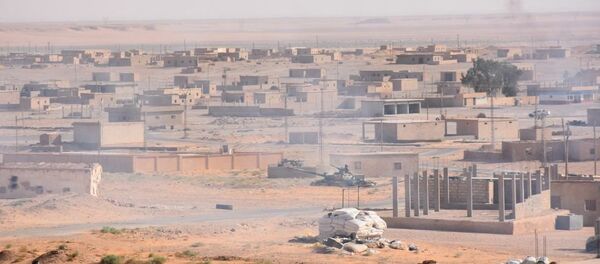DEIR EZ-ZOR (Syria) (Sputnik) — A barefoot little boy wearing village clothes who stands near a semi-destroyed house cannot but attract attention as he looks eager to receive visitors.
The boy’s family and the family of the widow of his father Sager’s brother live in the last house near the contact line in the al-Rashidiya district on the Euphrates River. But this romantic description of the place does not match the real life of the farmers.
RESIDENTIAL AREA IN WAR ZONE
We drive past the only water pump station in Deir ez-Zor along green trees until we run into a barrier with a military checkpoint.
"I am here with a correspondent from Russia, I work at a market and live in al-Rashidiya," Ali says. I accidentally met him a few hours ago on the busiest place in town, the shopping street.
The serviceman on duty carefully checks our documents and lets us in.
"You may go, but park your car in the backyard or under the mound. This is a war zone, shells and bullets can hit anytime," he says.
"For your information: there are several abandoned residential buildings in front of us, some of them are mined, they are about 500 meters [1640 feet] from the enemy lines. To the left, there is a narrow riverbed, and about 200 meters immediately behind it is the enemy again," Ali tells me.
A very small boy, barefoot but smiley, stands next to a house by the mound. When asked whether I can talk to the boy’s parents, my new friend Ali nods.
MURDERED FATHER OF FIVE CHILDREN
The concrete village house has nothing special about it: two floors, no plastering, unfinished – this is what millions of houses look like all across Syria. The boy sees an apple the strangers hold and reaches out to take it, immediately plunging his teeth into the fruit.
Having heard the engine noise, which is a rarity here, a smiley man and an old lady come out shortly.
"Good day, I am Abu Saleh, the house owner, how can I help you?" he asks a little tensely, reaching out his greeting hand and moving his son behind him. But as soon as he learnt that this Russian reporter and his fellow villager want to meet him and talk about him and his family’s life, he seems relieved.
The woman, when she hears that we want to talk about their life, begins to cry and, taking the guest’s hand, leads him to the backyard toward the stairs.
"A mine has killed my son. Right here, two years ago. He had a wife and five children. That girl over there is his wife, these two are twins, and the youngest child was only 40 days old when my son died," the grievous woman says.
The old lady is Abu Saleh’s mother, who has another eight children. Her husband died 20 years ago, and she brought up her kids on her own, working at the farm.
Today Saidia, as the lady is called, wears only black in the memory of her lost son.
CRIPPLING FOR FUN
The family has been living in Deir ez-Zor all their lives, and when the war began they did not leave, even when a part of the city was seized by the Free Syrian Army (FSA). Even when fighters gave their positions over to Jabhat al-Nusra (outlawed in Russia), and they, in turn, surrendered the city to Daesh in April 2014. Even when several months later Daesh besieged the part of Deir ez-Zor controlled by government forces.
The Daesh terrorists were regularly trying to breach city defenses exactly in the districts where Abu Saleh’s family lived. Children watch all unknown cars with fear and tears because terrorists used them as car bombs.
"When Daesh came really close, they started urging us from across the river to join them, to turn to their side and leave our home, and when we refused, they began regularly shooting our way … Probably for fun," Abu Saleh says about the most unpleasant days.
The neighbor who was the breadwinner of his family got shot in the hand last year when sitting on the porch of his house. The hand had to be amputated to save his life because there was no transport or communication to provide help in time. He is not the only one crippled because terrorist just had "fun."
CAULDRON CALLED ‘UMM-JONI’
The aroma of a family dinner being cooked is already coming from the backyard. A young woman in a kerchief and floor-length home dress tosses some wood under a big pot. The air around it smells with lots of various spices used to cook a traditional local dish called "karniyarik."
The favorite recipe is used here for the first time in six years. It has become very difficult to find meat since the beginning of the war. What could have been bought in the city during the first three years before Daesh surrounded the city cost the locals exorbitant amounts of money.
After a couple of hours with a regular Syrian family, it seems that there is no war raging outside and that you have known them for many years. The hosts insist on sharing the feast with them.
"Food will soon be ready in [our cauldron that we call] ‘Umm-Joni.’ Those are young sweet eggplants stuffed with soft lamb meat with spice and rice. The recipe was given to my wife by my mother. Potatoes are also stuffed in this cunning way, and all this stuff is stewed in tomato broth on the open fire in Umm-Joni. I am sure you have never tasted this before, and God has led you to our house today on purpose," the host tempts. He is happy when guests nod approvingly.
Abu Saleh’s neighbors were Christian, and once, back in the beginning of 2012, his wife’s friend lent them a pot. When the FSA fighters came, Christians left Deir ez-Zor, and the cauldron stayed, honoring the memory of the good neighbors. It is now known by the name Umm Joni, which is a polite way to call the neighbor housekeeper, its last female owner.
There were also Kurds in the village, who left for northeastern Syria’s city of Qamishli at the beginning of the war, and in several days their rich houses were robbed by the FSA. Today the husband of Abu Saleh’s younger sister lives in Qamishli with the former neighbors. He was evacuated from Deir ez-Zor about four months ago in critical condition. The ex-neighbors treat him as part of their family.
"They have taken care of him during all this time, and sometimes we talked on the phone. They never asked for money, although they bought medicines and food, and now promised to give him some money, so he could return to us as soon as the road opens for civil transportation," Abu Saleh says with gratitude and pride for his Kurdish neighbors.
COLD AND WAITING
"While besieged, we were succored by soldiers from the local garrison, who gave us bread and drinking water. This saved us from hunger between humanitarian aid handouts. In response, we invited soldiers to share hot meals with us. But this was in the beginning, when we had this opportunity," Abu Saleh says.
During the siege, farmers had to cut all their orchards for the sake of hot food and warmth in winter. There is not a single unbroken window in the house, and the walls are holed by artillery shells. It is cold in this part of Syria in winter, particularly at night.
"To be honest, we were fine during the first few months of the siege. Thanks to four cows and a small farm, we had enough food both for us and our neighbors. But the terrorists killed two cows, we also ate an old cow, sharing the meat between our families, and the last one was killed by a mine. So, we’ve been left with nothing," an old woman in black says, spreading a mat for the lunch.
Early in the siege, the family survived on cow milk, some of which was given to children and some sold for money to buy other food products. But this did not last long.
There is no table in the house. A dish and plates with rice and bread are arranged on the floor, and the family, joined by the guests, starts the long-awaited process.
All of them have forgotten the war and what they have experienced. Women and children are smiling as is typical for Syrians. Pouring sauce on tender eggplants, the man shows how to use bread instead of a spoon to make the food taste better. His sisters and wife, with visible pleasure, interrupting each other, dictate food recipes. Three-year-old Saleh, who has introduced us to his family, is trying to eat from our plates, as if they contained something new he has never tasted.
DEATH IN COURTYARD
We thank the friendly, sincere and simple family of farmers for this warm reception. Together with Ali we intend to go back to the market, where we plan to try the new hairdresser’s and its owner’s skill in using a straight razor.
A short ride and we are at our destination. It is growing dark. The marketplace is a hive of activity. A newly opened baker’s shop offers tandoor bread for 50 Syrian pounds (ten US cents) a flatbread. Kebab is sold two steps away. Hundreds of civilians and soldiers walk to and fro in the main street looking in bewilderment at the revitalized stalls lit by small multicolored bulbs.
A crowd of about dozen men with stripes of self-defense forces forms outside the hallway. Not trying to hide their tears, three young soldiers slip down the wall on their haunches, while their chief, a big bearded man, is attempting to comfort them.
"The weeping boys are three brothers. They were in the field when informed that their mother had been killed by a sniper in the city. Their commander let them come here to bid her farewell. The terrorist sniper opened fire on a street not far from here, nearer the frontline. The bullet hit her in the lung while she was on her way to an issuing point," the barber’s young assistant explains in a whisper as we are watching a modest wooden coffin being delivered to the hallway.








